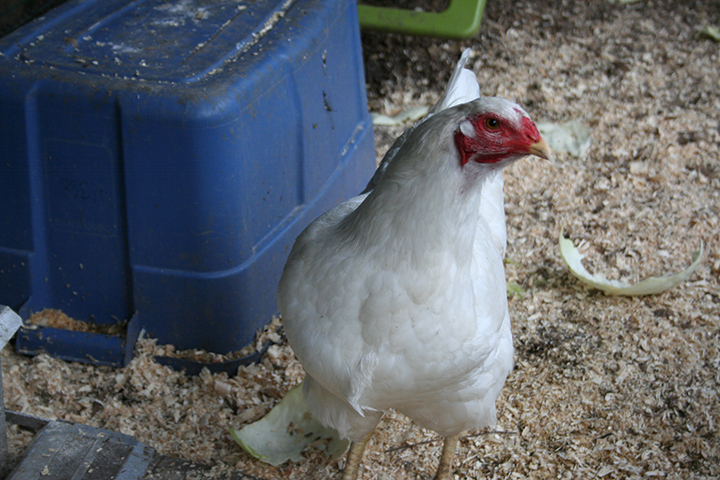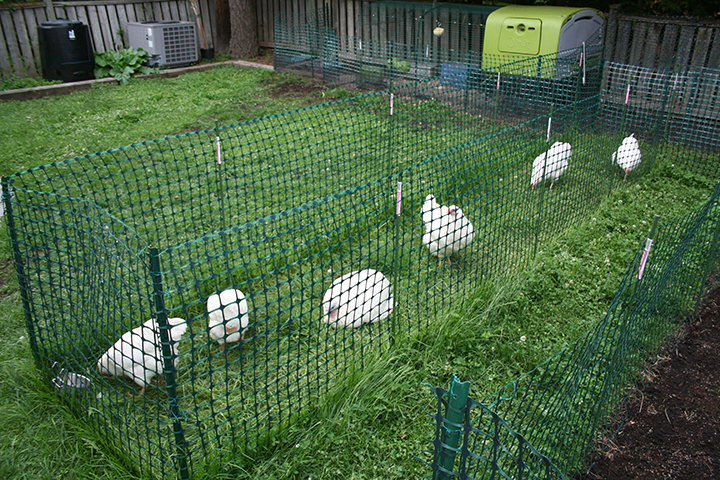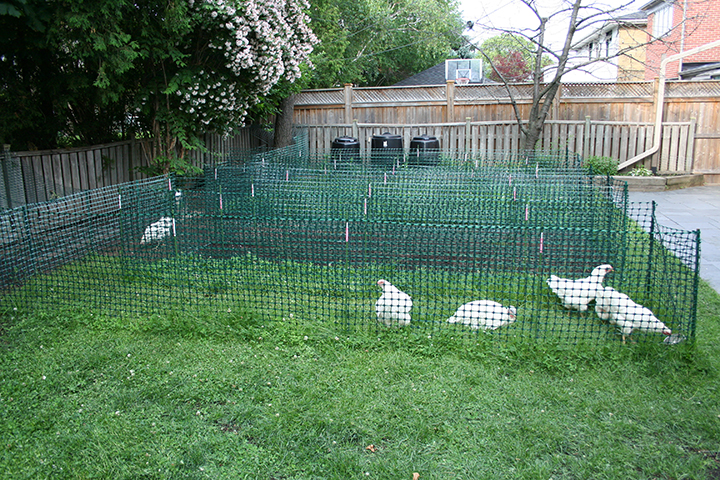TORONTO – As the price of groceries continues to climb, interest in urban farming in big cities like Toronto and Vancouver is on the rise. Besides growing fruits and vegetables, many people across the country also want to keep animals like chickens in their backyard. And while having a seemingly endless supply of fresh eggs sounds like a great idea, there are many important factors you need to know before setting up a coop and running out to buy a hen.

The rules surrounding backyard chickens
The rules surrounding backyard chickens vary across the country with only a few major Canadian cities allowing them. You can legally keep chickens in your yard in Vancouver, Victoria, Kelowna, Surrey, Montreal, Gatineau, Moncton and Whitehorse, but Toronto, Ottawa, Calgary, Halifax, Winnipeg, Regina and Saskatoon all ban the practice.
Edmonton currently has a pilot project in place until August 2015 that allows a certain number of homes to keep chickens, and smaller Alberta cities, such as Grand Prairie, Airdre, Peace River and Fort Saskatchewan allow them, as do the Ontario cities of Guelph, Waterloo, Brampton, Quinte West and Niagara Falls.
Most bylaws where chickens are allowed require a specific distance between the placement of the chicken coop in relation to the neighbour’s property line and most refer to keeping hens, not roosters, under the general term “chickens.” Some municipalities also require a permit if you wish to keep chickens in your yard.
READ MORE: One quarter of Canadians would rather not know what’s in their food: poll
TC, who runs the website torontochickens.com and wishes to remain anonymous, keeps five hens and a turkey in her Toronto backyard. She says most municipalities don’t allow chickens because of “misconceptions.”
She says as long as you are a good pet owner chickens are no different than a dog or cat.
“They’re not noisy, not noisier than a dog at least, and as soon as the sun goes down they go to sleep so there’s never any night noise.”
The city of Toronto won’t actively try to find people keeping chickens, but if someone complains they have to react. TC has received many notices from animal control to get rid of her chickens, but says there is no mention on them of what will happen if she doesn’t move them out of the city.
In an email to Global News, Toronto Animal Services confirmed that it only enforces the rule on a complaints-basis and that there is a fine associated if the notices to move the animals are ignored.
“If the person is found to have prohibited animals, they would be provided a timeframe to remove them, as per the bylaw. The fine for a prohibited animal is $240,” the email states.
Toronto Coun. Joe Mihevc tells Global News the city needs to change the bylaw to allow backyard hens.
“Basically, we allow dogs, we allow cats, we allow pigeons, we allow rabbits and the one pet-slash-animal we don’t allow is the one that allows us to feed ourselves,” he says.
“No one is looking for 20 chickens. It’s not about farming. It’s about setting a maximum — three or four or five [hens] for one home. The same way we regulate cats and dogs, we don’t allow you to have 20 dogs or 20 cats.”
Mihevc says that although there is a bylaw written to allow backyard hens in Toronto, the city is not actively trying to approve it.
“We tried last term to get the city to look at it and it didn’t make it through committee,” he explains. “It’s at the political end that we’re encountering resistance.”
What to expect having chickens in your backyard
The BC SPCA warns that raising backyard chickens is not a “suitable practice for individuals with little to no knowledge or experience in chicken care” and recommends consumers looking for alternatives to store-bought eggs purchase them from an SPCA-certified farmer instead instead of raising their own chickens.
Besides the legal issues, TC says there hasn’t been any challenges with keeping her backyard chickens. She says it only takes a few minutes of her time each day to manage them, with a big cleaning once a week being the most time-consuming.
READ MORE: Urban farming – not just growing food but communities
Winter care of backyard chickens can be problematic, however, and even TC admits it’s “not fun.”
- Canadian man dies during Texas Ironman event. His widow wants answers as to why
- ‘Shock and disbelief’ after Manitoba school trustee’s Indigenous comments
- Several baby products have been recalled by Health Canada. Here’s the list
- ‘Sciatica was gone’: hospital performs robot-assisted spinal surgery in Canadian first
“The main thing is to keep the wind out,” she explains. “The other thing is to get a breed that does well in the winter. Our breed was developed in Canada, in Quebec, and they do really well in the cold.”
Cartwright recommends having a humane slaughter plan or a plan to care for them as a pet once they stop laying eggs.
You also need to be aware of predators and disease that can hurt your hens and take precautions to prevent both. There’s also concerns of the chickens attracting rodents, such as rats. TC says if you properly manage them and don’t keep the chicken feed out this won’t be an issue.
“Rats aren’t interested in chickens, they’re interested in the feed,” she says.
Mihevc says that while some people will be sloppy with backyard hens, there is no health or cleanliness concerns surrounding them.
“Vancouver has some exhaustive public health analysis around avian flu and identify that this is not a worry in the least from their perspective. There’s no red lights here other than people’s perceptions.”
Benefits of backyard chickens
The biggest benefit of having hens in your backyard is the fresh eggs they produce. On average, a hen will give an egg a day. If you have three hens, you’re looking at about 91 dozen eggs a year. TC says the eggs are also “far superior” than the ones from the store.
“You get more omega-3 fatty acids, you get more vitamin A. Because the chickens are outside they get sun and you get vitamin D from the eggs, which you wouldn’t normally get,” she says.
There are also great educational and environmental benefits of having backyard chickens.
“Environmentally, it’s a lot less wasteful,” TC says. “We used to buy eggs. We would drive to the store and pick up a dozen or two dozen eggs and the cartons would go in our blue box and the next week we would go shopping again and we would have more cartons.”
TC says chicken droppings, which are rich in nitrogen, also make good fertilizer.
Getting started
If you are set to move forward with the idea of backyard chickens, TC recommends you start small.
“Somewhere between three and seven is a good number. You never want to have just one chicken because it would be very sad. They’re social animals.”
She also recommends you “bribe your neighbours with eggs,” and be a good pet owner.
“Make sure it doesn’t smell, make sure it’s clean and tidy and make sure they don’t escape.”
The biggest upfront cost associated with backyard chickens is the coop, which is also the most important piece of equipment needed. A proper coop costs anywhere from a few hundred to a few thousand dollars.
READ MORE: Who do Canadians trust with their food? Local growers get top marks, new poll finds
A rodent-proof feeder is recommended and fencing to prevent the chickens from escaping (and any predators from getting in) is also required around the coop.
Chicken feed costs about $15 for a regular bag and $30 for organic. It’s only needed a couple of times per year, making it less expensive than feeding a dog.
For those concerned about making the investment, there are chicken rental programs in some Canadian cities, including Toronto.
Backyard Bok Boks in Guelph, Ont. offers a package that includes three heritage hens, a waterproof coop, bedding and nesting box straw, organic feed and predator-proof electric fencing. They also include delivery and pick-up. Prices vary depending on how long you want to house the hens. A two-week trial costs $349, a month is $399, and for the entire summer (3 months) the cost is $749.
Pennsylvania-based Rent the Chicken, which recently expanded to Toronto and PEI, offers multiple packages depending on how serious you want to get.
The standard package runs from June to October and includes two hens, an easily movable coop, food and water dishes, feed, a guide on taking care of chickens, a copy of Lisa Steele’s Fresh Eggs Daily and delivery and setup. The package is priced, before taxes, at $275 in PEI and $375 in Toronto. The deluxe package includes everything in the standard package but comes with four hens instead of two. It costs, before taxes, $575 in Toronto and $475 in PEI.
Whether you decide to rent or buy your backyard chicken setup, the BC SPCA has a list of important questions on its website you should ask yourself before moving forward.
SOUND OFF: Do you believe backyard chickens are a good idea? Do you plan to get any? Share your thoughts in the comments below or on our Facebook page.
Resources
- Toronto Chickens
- BC SPCA: Do you want to raise backyard hens?
- Raising Chickens at Home (Canadian Family)
- Fowl Play? A Look into Recent Canadian Reform Efforts for Backyard Chicken Legislation
- Home fresh eggs: How to raise chickens in your backyard (Canadian Living)
- Hipster farmers abandoning urban chickens because they’re too much work (National Post)










Comments